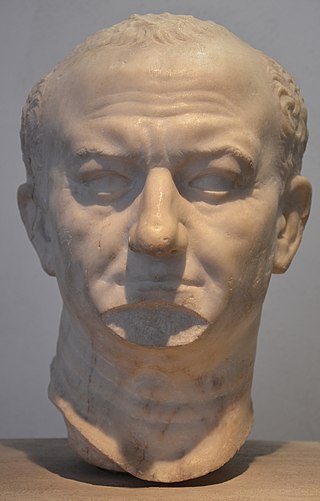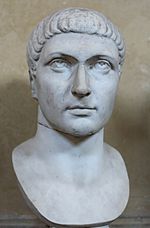
Constantius II was Roman emperor from 337 to 361. His reign saw constant warfare on the borders against the Sasanian Empire and Germanic peoples, while internally the Roman Empire went through repeated civil wars, court intrigues, and usurpations. His religious policies inflamed domestic conflicts that would continue after his death.

Constantine II was Roman emperor from 337 to 340. Son of Constantine the Great and co-emperor alongside his brothers, his attempt to exert his perceived rights of primogeniture led to his death in a failed invasion of Italy in 340.
The 330s decade ran from January 1, 330, to December 31, 339.

Year 337 (CCCXXXVII) was a common year starting on Saturday of the Julian calendar. At the time, it was known as the Year of the Consulship of Felicianus and Titianus. The denomination 337 for this year has been used since the early medieval period, when the Anno Domini calendar era became the prevalent method in Europe for naming years.

Flavius Valerius Constantius, also called Constantius I, was a Roman emperor from 305 to 306. He was one of the four original members of the Tetrarchy established by Diocletian, first serving as caesar from 293 to 305 and then ruling as augustus until his death. Constantius was also father of Constantine the Great, the first Christian emperor of Rome. The nickname "Chlorus" was first popularized by Byzantine-era historians and not used during the emperor's lifetime.

Flavia Maximiana Theodora was a Roman empress as the wife of Constantius Chlorus.

Flavius Claudius Constantius Gallus (326–354) was a statesman and ruler in the eastern provinces of the Roman Empire from 351 to 354, as Caesar under emperor Constantius II, his cousin. A grandson of emperor Constantius Chlorus and empress Flavia Maximiana Theodora, and a son of Julius Constantius and Galla, he belonged to the Constantinian dynasty. Born during the reign of his uncle Constantine the Great, he was among the few male members of the imperial family to survive the purge that followed Constantine's death. Under Constantius II, Gallus served as deputy emperor, based in Antioch and married to Constantius' sister Constantina. He dealt with a Jewish revolt in the years 351-352. Gallus ultimately fell out of favor with Constantius and was executed, being replaced as Caesar by his younger half-brother Julian.

The gens Flavia was a plebeian family at ancient Rome. Its members are first mentioned during the last three centuries of the Republic. The first of the Flavii to achieve prominence was Marcus Flavius, tribune of the plebs in 327 and 323 BC; however, no Flavius attained the consulship until Gaius Flavius Fimbria in 104 BC. The gens became illustrious during the first century AD, when the family of the Flavii Sabini claimed the imperial dignity.
Flavius Dalmatius, also known as Dalmatius the Censor, was a censor (333), and a member of the Constantinian dynasty, which ruled over the Roman Empire at the beginning of the 4th century.

Flavia Julia Constantia was a Roman empress as the wife of Licinius. She was the daughter of the Roman emperor Constantius Chlorus and his wife Flavia Maximiana Theodora, and younger half-sister of Constantine the Great.

Flavia Valeria Constantina, later known as Saint Constance, was the eldest daughter of Roman emperor Constantine the Great and his second wife Fausta, daughter of Emperor Maximian. Constantina may have received the title of Augusta from her father, and is venerated as a saint, having developed a medieval legend wildly at variance with what is known of her actual character.

Flavius Hannibalianus was a member of the Constantinian dynasty, which ruled over the Roman Empire in the 4th century AD.

The Constantinian dynasty is an informal name for the ruling family of the Roman Empire from Constantius Chlorus to the death of Julian in 363. It is named after its most famous member, Constantine the Great, who became the sole ruler of the empire in 324. The dynasty is also called Neo-Flavian because every Constantinian emperor bore the name Flavius, similarly to the rulers of the first Flavian dynasty in the 1st century.

Flavius Dalmatius Caesar was a Caesar (335–337) of the Roman Empire, and member of the Constantinian dynasty.

Constantia (362–383) was the first empress consort of Gratian of the Western Roman Empire. According to Ammianus Marcellinus, her mother was Faustina and her father was Constantius II, who died before Constantia was born.
Helena was the wife of Julian, Roman emperor in 360–363. She was briefly Roman empress when Julian was proclaimed Augustus by his troops in 360, but died prior to the resolution of his conflict with Constantius II.
An unnamed daughter of Julius Constantius was the first wife of Constantius II.
Eusebius was a high-ranking officer of the Roman Empire, holding the position of praepositus sacri cubiculi during the rule of Emperor Constantius II (337-361).
Galla was the first known wife of Julius Constantius, a member of the Constantinian dynasty.
Basilina was the wife of Julius Constantius and the mother of the Roman emperor Julian who in her honour gave the name Basilinopolis to a city in Bithynia.













